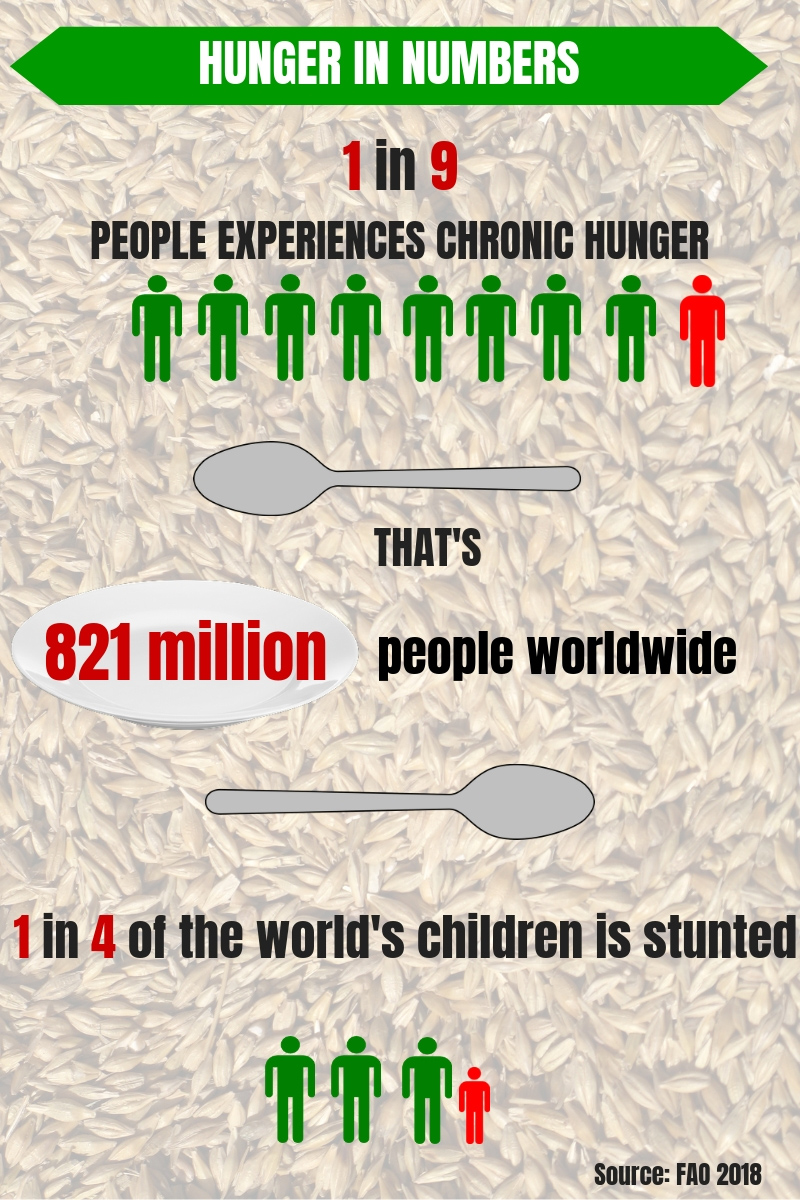The U.K. has been one of the wealthiest countries on the planet for centuries. Despite this, however, poverty remains a serious issue in the country. An estimated 13.5 million people live below the poverty line. Last year, one in five people struggled to put food on their table, with more than half a million reliant on food banks in order to feed themselves and their families. The question remains as to what the primary causes of poverty in the U.K. actually are.
- It may seem counter-intuitive to think that for a country recording its lowest rates of unemployment, that employment could be a cause of poverty. While work is assumed to be the main way for people to escape poverty, this is not always the case. For those in low-paid jobs or part-time work, income can be limited. Coupled with such positions often have little potential for progression, certain employment opportunities seem to exacerbate poverty rather than offer the relief many people need.
- A lack of education and technical skills is another primary cause of poverty in the U.K. Around five million U.K. adults do not have basic literacy and numeracy skills, leaving them at a serious disadvantage when it comes to finding gainful employment. Compounding matters, 12.6 million lack any form of digital skills, since many employment opportunities involve at least a small amount of computer use.
- Issues in home life can facilitate a fall into poverty, for example, domestic violence, substance abuse or underemployment. Children are often at risk in situations such as these, with research showing that boys raised in a difficult household are far likelier to be excluded from school or become involved in criminal activity. For girls, the situation is similar, with those growing up in similar circumstances show to be more at risk of mental health problems as well as more likely to enter into early parenthood, at times characterized by further abuse.
- Inadequacies in the benefits system can also cause further poverty. For many, the system can be difficult to understand and navigate, which can lead to mistakes or delays in payment. For many, the benefits they receive are simply not enough to help them avoid poverty. In fact, it is estimated that for a family with one child claiming benefits, receives around 65 percent of the required amount to keep them above the poverty line.
- The final primary driver of poverty in the U.K. is the cost of goods and services. Between 2008 and 2014, living costs increased three times faster than the average wage. The cost of housing, food and utilities have quickly risen in recent years, with increased childcare costs also placing a strain on families' finances.
Those who suffer from this insidious affliction continue to gamble despite being fully aware of the negative consequences. As is the case with substance abuse, gambling addiction can lead to a variety of other issues such as poverty, depression, and even suicide. Many problem gamblers also abuse drugs and/or alcohol. 25 November, 2020 Problem Gambling and Homelessness. In this blog, our events and marketing lead Gwyn Thomas de Chroustchoff interviews Diana Yorath, Wales Development Officer for Ara Gambling Service, to talk about gambling problems in Wales during lockdown, and considers research by Dr Steve Sharman about the intersection between gambling, poverty and homelessness. USA Casino Expert is How Does Gambling Lead To Poverty an independent community of gambling industry professionals founded in 2017. The main goal of our How Does Gambling Lead To Poverty team is to provide recommendations on the choice of safe, reliable and trusted online casinos, welcome bonuses and gambling for players from the United States. Advertising that counteracts media stories that glorify gambling, or that provide a more balanced assessment of gambling, are important to improve public awareness about gambling-related harms that can lead to poverty and homelessness.
While these issues are problematic for many people across the U.K., attempts have been made to alleviate the damage. The national living wage, introduced in 2016, was created in order to reflect the costs incurred by working people in the country. There are charities such as the Child Poverty Action Group and End Child Poverty that target vulnerable families. Though it may take time, the fight is certainly underway against poverty in the U.K.
– Gavin Callander
Photo: Flickr


For a long time, it has baffled me how so many people in this world can ignore evidence that is right in front of their eyes. It just shows the power of propaganda.
Specifically, I don't understand how so many people can advocate socialistic policies and not think they will lead to bad results.
Economics can be tough in that it's hard to find evidence based on real world events. While some economists think you can use mathematical formulas to study economics, it's really about reasoning and studying human action. But if you make specific economic claims, it's usually hard to prove your point with an example.
For instance, you could say that an increase in the minimum wage will likely lead to higher unemployment. But you can't test this in a vacuum. You can't test any economic theories in a vacuum because we don't live in a vacuum.
The saying is 'if all else stays the same.'
An increase in the minimum wage will likely lead to higher unemployment, if all else stays the same. The problem here is that everything else does not stay the same. Almost nothing stays the same.
When you have many variables contributing to a certain outcome, it becomes hard to test those variables on their effect.
With that said, I think we can use real life examples in demonstrating the horrible effects of socialistic policies. Let's look around the world.

Three Examples
First, let's take three examples of places in the world where there is a relatively free market economy with low taxes, low government regulations, and strong property rights. Three places that always come to my mind are Hong Kong, Singapore, and the United Arab Emirates.
These places are far from perfect. I don't think any of them rank as high as the U.S. in terms of social freedoms such as religious freedom and free speech. And even economically speaking, all of these places have some central state planning involved. It's just that these three places are economically free in comparison to most other places on the planet.
(As a side note, some people mistakenly believe that the United Arab Emirates is a wealthy place because of oil. But oil actually makes up a fairly small percentage of the overall economy. The UAE, and in particular Dubai, has tourism and international business as the main economic drivers.)
So while taxes and regulations are low in Hong Kong, Singapore, and the UAE, we also see some of the richest places in the world. These are really wealthy countries and are quite attractive places to entrepreneurs and corporations. A place like the UAE is also desirable for immigrants, as it is an opportunity for people from third-world countries to make a living.

So even the poor people in these countries will find better living conditions. And many immigrants can work there and send money back to their families living in a poor country.
While there is certainly a great disparity in wealth and income, I would much rather be a poor person living in Dubai than a poor person living in India. Your living conditions will be better in Dubai, and at least you have a chance to move up in the world.
And even though property prices are high in Singapore and Hong Kong, you will find a far higher standard of living in these places than almost anywhere else, but especially the third-world countries.
Which Standard of Living do you Prefer?
How Does Gambling Lead To Poverty? | Yahoo Answers
Online casino slot machines real money. Compare these wealthy countries to almost anywhere in Africa and many places in Asia and South America. They are different worlds.
Look at Venezuela and the horrible decline of that country from the socialist policies. You can even look at Greece, a massive welfare state, where many people are struggling just to put a decent meal on the table.

For a long time, it has baffled me how so many people in this world can ignore evidence that is right in front of their eyes. It just shows the power of propaganda.
Specifically, I don't understand how so many people can advocate socialistic policies and not think they will lead to bad results.
Economics can be tough in that it's hard to find evidence based on real world events. While some economists think you can use mathematical formulas to study economics, it's really about reasoning and studying human action. But if you make specific economic claims, it's usually hard to prove your point with an example.
For instance, you could say that an increase in the minimum wage will likely lead to higher unemployment. But you can't test this in a vacuum. You can't test any economic theories in a vacuum because we don't live in a vacuum.
The saying is 'if all else stays the same.'
An increase in the minimum wage will likely lead to higher unemployment, if all else stays the same. The problem here is that everything else does not stay the same. Almost nothing stays the same.
When you have many variables contributing to a certain outcome, it becomes hard to test those variables on their effect.
With that said, I think we can use real life examples in demonstrating the horrible effects of socialistic policies. Let's look around the world.
Three Examples
First, let's take three examples of places in the world where there is a relatively free market economy with low taxes, low government regulations, and strong property rights. Three places that always come to my mind are Hong Kong, Singapore, and the United Arab Emirates.
These places are far from perfect. I don't think any of them rank as high as the U.S. in terms of social freedoms such as religious freedom and free speech. And even economically speaking, all of these places have some central state planning involved. It's just that these three places are economically free in comparison to most other places on the planet.
(As a side note, some people mistakenly believe that the United Arab Emirates is a wealthy place because of oil. But oil actually makes up a fairly small percentage of the overall economy. The UAE, and in particular Dubai, has tourism and international business as the main economic drivers.)
So while taxes and regulations are low in Hong Kong, Singapore, and the UAE, we also see some of the richest places in the world. These are really wealthy countries and are quite attractive places to entrepreneurs and corporations. A place like the UAE is also desirable for immigrants, as it is an opportunity for people from third-world countries to make a living.
So even the poor people in these countries will find better living conditions. And many immigrants can work there and send money back to their families living in a poor country.
While there is certainly a great disparity in wealth and income, I would much rather be a poor person living in Dubai than a poor person living in India. Your living conditions will be better in Dubai, and at least you have a chance to move up in the world.
And even though property prices are high in Singapore and Hong Kong, you will find a far higher standard of living in these places than almost anywhere else, but especially the third-world countries.
Which Standard of Living do you Prefer?
How Does Gambling Lead To Poverty? | Yahoo Answers
Online casino slot machines real money. Compare these wealthy countries to almost anywhere in Africa and many places in Asia and South America. They are different worlds.
Look at Venezuela and the horrible decline of that country from the socialist policies. You can even look at Greece, a massive welfare state, where many people are struggling just to put a decent meal on the table.
The point here is that countries that adopt free market capitalism are wealthy and the people there generally have a high standard of living. In countries that turn away from free markets and resort to socialist policies and major central planning, we see massive poverty and a generally low standard of living.
I don't understand why so many people can't see the obvious correlation.
If free markets lead to a better life and socialist/ interventionist policies lead to poverty and suffering, why do so many people still allow the government to enact these socialist and interventionist policies?
Cached
The Best Free Investment You'll Ever Make
We never spam! View our Privacy Policy
After getting your report, you'll begin receiving the Wealth Daily e-Letter, delivered to your inbox daily.
